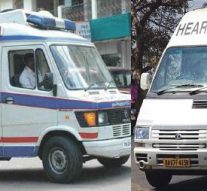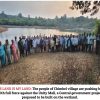Goa is abuzz with excitement as vintage bike and car owners, users, collectors and fans are decking […]

YOU WILL ALSO BECOME A SENIOR CITIZEN!
Life & Living, Sep 06- Sep 12, 2025 September 5, 2025LAST week, a neighbor of ours, who lived in her parental or ancestral house, died of a critical illness all, all alone. The 60 years something ailing woman lives alone, sustained by the rent she got from migrant tenants staying in rooms she’d rigged up in her large background. She had scattered across Goa and abroad. She took care of her lovely house frontage and her migrant tenants did odd jobs for her.
Migrants tenants are by and large illiterate or semi-illiterate, barely educated. They make the most of their small rented basti rooms with their children with perhaps both parents going out for sundry jobs for a livelihood. They are certainly in no position to leave their own lives and take their landlady to the Goa Medical College & Hospital if she calls an ambulance in an emergency – which reportedly she did one evening. But the ambulance which came would not take her to the hospital because she had no relative or caretaker with her, the ambulance staff checked her condition and gave her some medicines and left her to mercy of her tenants.
None would go with her to the hospital though for they said they could not be able to cope with the GMC ward demands of admission and other formalities. Our friend was ailing, depressed, because she could find no one to take charge of her and her ailign condition needing serious treatment and rehabilitation.
If you go to a public hospital you need someone to run around for you getting and filling up admission forms anda that too after a doctor has admitted the patient for further hospital treatment. If you want to be admitted to a GMC ward you have to produce an ID, even if you are a niz Goenkar.
As an emergency patient you may be entertained in Casualty, but if any admission has to be done paperwork is necessary. In fact, in Casualty or the OPDs, you will not get any attention unless you your papers and appointment via tokens collected in advance.
AMBULANCE SERVICES
TRAGICALLY, the ambulance which arrived at our neighbor’s place refused to take her to the hospital although she has been a GMC patient in the past. Why? She had nobody to accompany her. Nobody was willing to accompany her although she was a critical patient. One of her migrant tenants, a mother of little kids, did her housework for her and took care of her feeding needs, but she couldn’t be with her in a hospital ward at all. That day a week ago when she called for the ambulance to the GMC, and if she had been admitted and treated, perhaps she could have got sorted her health problem and still be alive, got an extension of life. Abandoned as she was in isolation and nobody to run interference for her she was helpless and not surprisingly passed away alone one early morning on her bed, nobody by her side.
THIS real life story is alarming and made me apprehensive too, with my wife who was friends with our neighbor. As an aging couple I’m 77 years old and she is 75 and both of us have health issues although hers are not to critical but also need taking care of. What if we face similar problems as our neighbor one fine day not too far away. If my better three-quarters has a health crisis I am not in a position to even take myself to GMC Casualty on my own, being partially disabled. What if I can’t find someone to take me or be with me in a ward if I have to be admitted once again? Neither of have relatives in Goa who may bother about us, or for that matter even out of Goa.
Hey, a patient’s mind and memory may be perfectly intact and you may be conscious, but this is not enough for the 108 ambulance staff to take you to the Casualty if no one is accompanying you as a relative. The bitter ground reality is that senior citizens with disabilities and medical issues do live all, all alone and may or may not have somebody to call their own – in which case if there is a medical crisis of life or death, who can they call on for immediate help? In our healthcare system there are no supportive infrastructure at all for the elderly living alone and with nobody on the spot or nearly to vouch for them or take care of their needs financial or otherwise. The state of Goa offers no support system in such cases which are actually increasing in number and will continue to increase.
Regrettably, none of the religious organizations — church or Hindu temples or mosques — have any caretaking services in place to take care of the ailing elderly of their own community. Reportedly, various Church bodies are happy to take care of your burial provided you have made arrangements in advance and paid for it – all before you reach life’s final ending. There may be or there may be none – relatives or friends – to take care of a relative or a friend who has died.
ASSISTANCE BEFORE, NOT AFTER
IN the case of my neighbor, the parish priest of the Caranzalem church very promptly visited her home after she was dead to make the burial arrangements. Only because she had deposited the amount required in advance. But this church which is next to her residence less than a 100 meters away did not offer any help in providing food or providing medical relief to the patient while she was alive and ailing.
Though there are number of church-linked NGOs like Caritas or St Vincent D Paul and no doubt countless other religious establishments nobody comes to help out to those elderly who are very devout Catholics but perhaps not so well off. There are no NGOs and not even Street Providence which provides help to senior citizens living alone in their own or rented homes.
Mind you this neighbor of ours was not destitute but quite willing to pay whatever money due for help she needed. It looked like she didn’t have any extended family or if she did none turned up before, only after she passed away. That is the usual appalling case it seems. From what I gather she has a sister in an old age home in Thivim and one in London and her tenants tell mixed stories when asked…the crux of the matter is forget love, even for money one may not find adequate caring help at the right time. Where is palliative care and what is it, is it provided only in nursing homes or at home too where a patient may be more comfortable at life’s last days? Palliative care is defined as assistance to those old and feeble and disabled and unable to provide for themselves in cash and/or in kind. Who takes stock of all this details and stretches out a helping hand?
In theory, the State government and the Goa Medical College & Hospital do have a palliative care policy. The palliative care policy was launched with great fanfair in February 2025 in collaboration with the Directorate of Health Services. Despite this is part of the National Program for Palliative Care. The claim is that GMC’s concerned team of doctors provide telephonic and online palliative support. There is no mention about home visits by anyone, doctors or even nurses. All that GMC has been doing is organizing workshops on dealing with terminal care of patients, how does all this translate in real life?
The only department that officially claims to offer palliative care is the Department of Oncology led by Dr Anupama Borkar. The South Goa District hospital also claims to offer community and home-based palliative care and end of life emergency assistance. But at ground level nobody has seen it or I haven’t heard any patient praising it. Does it exist at all or is all talk, talk and talk.
Indeed, as Donald Fernandes of Street Providance keeps repeatedly pointing out, Goa does not even have a home for destitutes who have been abandoned by their families and this does include elderly seeking refuge in unlikely public spaces. Street Providence has now suspended some of its charitable services, complaining of delay in government grants, insisting that it will pick up destitute folk only if the Police Station in its locality does the needful. This is probably because of the fear that relatives of the thrown out of their own home patients may accuse the NGO of kidnapping relatives in need and want. Are our police staff equipped and trained to be good Samaritans for the elderly and abandoned at home or public places?
Logically, Goa’s Primary Health Centers along with the Social Welfare Department should be entrusted and enabled to take care of destitute and the ailing elderly living alone. The Portuguese government had an Provodoria running several homes for senior citizens, and the mentally and physical disabled with nowhere to go. It was taken over by the government but the entire system seems to have collapsed after the exit of Pratapsingh Rane. During the tenure of Pratapsingh Rane as chief minister, his wife Vijayadevi Rane looked after the Provedoria services for those in various difficult end of life situations.
LIVING LONGER NOT A CRIME
THIS is a major crises in Goa as people live longer now. Ironically, very good health facilities enabled Goans to live better up into their 80s and 90s and even score a century. The most high profile super senior citizen is Libby Lobo Sardesai who crossed a century, recently. But unlike Libby Lobo Sardesai, who is veteran freedom fighter and a Padmashree awardee, most senior citizens in villages are virtually invisible and abandoned. This is particularly true in Catholic families where not even children but grandchildren are educated. However, there is no one willing to look after the folk in their old run-down ancestral house. Relatives may or may not send financial assistance but few will stretch it to giving quality time to senior citizens (unless there is something to be gained).
Churches, Hindu and Muslim charitable institutions have the resources and manpower to provide end of life support infrastructure. The church is extremely well organized and parish councils which benefit immensely courtesy generous funds from senior citizens can easily provide palliative care to those in need and want.
Likewise even Hindu temple associations and committees and the Muslim organizations can put their funds towards a cause as worthy as this one. Don’t they all levy charges for rites and rituals performed whether it be marriage or birth or death or some other auspicious occasion? Surely funds may be set aside to aid the elderly who are in pain and in need of assistance, whatever it be, before death and not afterwards when there are charges for cremation and burial and whatever else. What we need is a change in mindset – to offer help before and not after the time is over. Remember how your grandparents cared and pampered you as toddlers and as you grew older and needed all kinds of assistance in cash and in kind. Let’s come up with a some kind of “Saas bhi khabhi bahu thi” serial ideas to keep the aging folk in a family healthy and happy and do the right thing at the right time.















